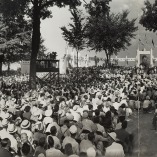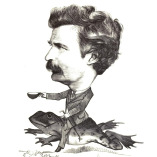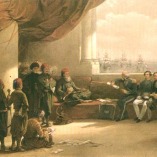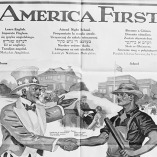
Gregory Peck publicity photo for the film Moby Dick, 1956. Wikimedia Commons.
“Father Mapple is in some strange, almost obscure way, a kind of negative double for Ahab,” says novelist and critic Charles Baxter in this episode of The World in Time. “Like Ahab, he is speaking from a great height. He begins his sermon by issuing orders. He tells all the congregants to sit down. And, you know, they have to listen to him. What other choice do they have? But what is important to me in ‘The Sermon’ is that he—how can I put this?—he is the person who wants to bring a sense of proportion. And Ahab is the person who wants you to give up any sense of proportionality. It’s almost impossible to put things into perspective with Ahab. Father Mapple kind of supplies a warning and a possible lens for a reading of the entire novel. What Mapple is saying in his sermon, starting from the Book of Jonah, is that we have to learn humility. It is no use to flee from God. God will find us. And the last paragraph of ‘The Sermon’ is one of the most beautiful things, I think, that Melville ever wrote.”
Charles Baxter, author most recently of Blood Test: A Comedy and Wonderlands: Essays on the Life of Literature, visits The World in Time to talk with Donovan Hohn about the politics and the mysteries of charisma in Moby Dick. The conversation dwells on chapter 9, “The Sermon,” in which Father Mapple, from his cockpit of a pulpit, pilots a congregation of New Bedford whalers through the theological storms of the Book of Jonah. Baxter and Hohn consider whether the novel affirms what Father Mapple preaches. They contrast his humble leadership with Captain Ahab’s narcissistic yet magnetic charisma. And they consider what both Ahab and a showman like P.T. Barnum might reveal about the charismatic confidence men who command our attention today.
Earlier episodes in our series about Moby Dick: Episode 7 with Daniel Mendelsohn, Episode 8 with Wyatt Mason, Episode 10 with Francine Prose, and Episode 12 with James Marcus.
WORKS CITED
(In order of mention.)
“Dark Charisma.” Donovan Hohn, Charles Baxter, and Francine Prose, live at Hannah Arendt Center at Bard College in Annandale-On-Hudson, NY, October, 16, 2025. (Tickets available here.)
Elizabeth Hardwick. Sleepless Nights. Introduced by Geoffrey O’Brien. New York: New York Review Books, 2011.
W.G. Sebald. The Rings of Saturn. Translated by Michael Hulse. New York: New Directions, 2016.
Evan S. Connell. Mrs. Bridge. Berkeley: Counterpoint, 2010.
Edward P. Jones. Lost in the City. New York: Amistad Press, 2004.
Paula Fox. The Widow’s Children. Introduced by Andrea Barrett. New York: W.W. Norton & Company, 1999.
Kathryn Davis. Labrador. Minneapolis: Graywolf Press, 2019.
Lydia Davis. The End of the Story. London: Picador, 2004.
Charles Baxter. The Art of Subtext: Beyond Plot. Minneapolis: Graywolf Press, 2007.
Charles Baxter. Burning Down the House: Essays on Fiction. Minneapolis: Graywolf Press, 2008.
Charles Baxter. Wonderlands: Essays on the Life of Literature. Minneapolis: Graywolf Press, 2022.
Charles Baxter. “The Flag of Ahab: On the literature and politics of charisma,” Roundtable from Lapham’s Quarterly, Monday, September 22, 2025.
Herman Melville. Moby-Dick: A Norton Critical Edition. Edited by Hershel Parker. New York: W.W. Norton & Company, 2017.
Herman Melville. “Chapter 135: The Chase—Third Day.” In Moby-Dick: A Norton Critical Edition. Edited by Hershel Parker. New York: W.W. Norton & Company, 2017.
Charles Baxter. The Sun Collective: A Novel. New York: Vintage Books, 2021.
Charles Baxter. Blood Test: A Comedy. New York: Pantheon, 2024.
P.T. Barnum. The Life of P.T. Barnum. New York: Cosimo Classics, 2007.
Charles Baxter. “Hatching Monsters: Lessons in fame from P.T. Barnum's autobiography,” Lapham’s Quarterly, Winter 2011: Celebrity.
Charles Baxter. “Charisma and Fictional Authority—Nine Fragments toward an Essay.” In Wonderlands: Essays on the Life of Literature. Minneapolis: Graywolf Press, 2022.
Herman Melville. “Chapter Nine: The Sermon.” In Moby-Dick: A Norton Critical Edition. Edited by Hershel Parker. New York: W.W. Norton & Company, 2017.
Herman Melville. “Chapter Seven: The Chapel.” In Moby-Dick: A Norton Critical Edition. Edited by Hershel Parker. New York: W.W. Norton & Company, 2017.
Herman Melville. “Chapter Eight: The Pulpit.” In Moby-Dick: A Norton Critical Edition. Edited by Hershel Parker. New York: W.W. Norton & Company, 2017.
Book of Jonah. In The Bible: Authorized King James Version with Apocrypha. Edited by Robert Carroll and Stephen Prickett. Oxford: Oxford University Press, 2008.
Susan VanZanten Gallagher. “The Prophetic Narrator of Moby-Dick,” Christianity and Literature, Spring 1987. JSTOR.
Herman Melville. “Chapter 10: A Bosom Friend.” In Moby-Dick: A Norton Critical Edition. Edited by Hershel Parker. New York: W.W. Norton & Company, 2017.
John Huston, director. Moby Dick. Screenplay by Ray Bradbury and John Huston. Warner Bros. Pictures, 1956.
William Shakespeare. Macbeth. Edited by Barbara A. Mowat and Paul Werstine. New York: Simon & Schuster, 2003.
Nathaniel Hawthorne. “The Birthmark.” In Mosses From an Old Manse. Introduced by Mary Oliver. New York: Modern Library, 2003.
Book of Job. In The Bible: Authorized King James Version with Apocrypha. Edited by Robert Carroll and Stephen Prickett. Oxford: Oxford University Press, 2008.
Book of Matthew. In The Bible: Authorized King James Version with Apocrypha. Edited by Robert Carroll and Stephen Prickett. Oxford: Oxford University Press, 2008.
John Winthrop. A Model of Christian Charity. New York: Cosimo Classics, 2020.
Herman Melville. Pierre; or, The Ambiguities. Introduced by William Spengemann. New York: Penguin Books, 1996.
Herman Melville. “Book XXII: The Flower-Curtain Lifted from before a Tropical Author; with Some Remarks on the Transcendental Flesh-Brush Philosophy.” In Pierre; or, The Ambiguities. Introduced by William Spengemann. New York: Penguin Books, 1996.
Andrew Delbanco. Melville: His World and Work. New York: Vintage Books, 2006.
Herman Melville. Omoo: A Narrative of Adventures in the South Seas. New York: Penguin Books, 2007.
John Milton. Paradise Lost. New York: Penguin Classics, 2003.
Ralph Waldo Emerson. Essays and Lectures. New York: Library of America, 1983.
Johann Wolfgang von Goethe. Faust. Translated and introduced by Walter Kaufmann. New York: Vintage Books, 1962.
Stephen Spielberg, director. Jaws. Universal Pictures, 1975.






